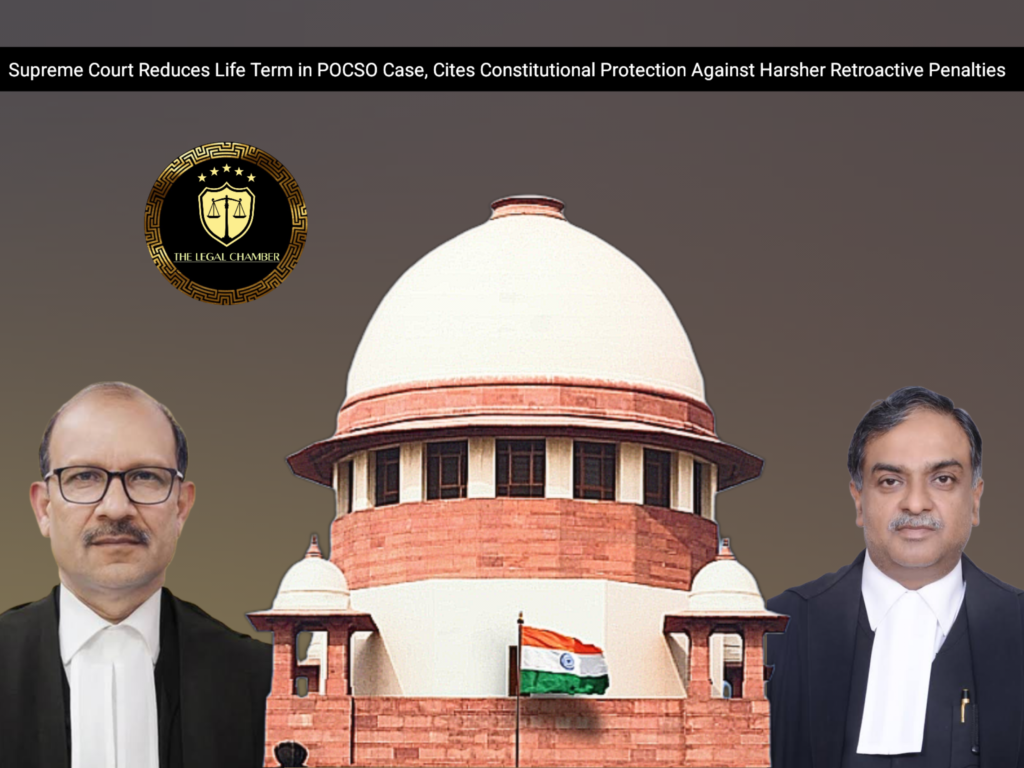
The Supreme Court upheld the conviction under Section 6 of the POCSO Act but modified the sentence. Relying on Article 20(1) of the Constitution, it held that the enhanced punishment of imprisonment for the remainder of natural life, introduced by the 2019 amendment, could not be applied retrospectively to an offence committed prior to its enactment.
Facts Of The Case:
On May 20, 2019, the appellant, Saturam Mandavi, was accused of luring a five-year-old girl to his house and raping her while her parents were away attending a marriage ceremony in the village. The victim’s mother, upon returning and being unable to locate her daughter, confronted the appellant at his house, after which he fled. An FIR was subsequently registered against him. The Trial Court convicted the appellant under Section 376AB of the Indian Penal Code and Section 6 of the POCSO Act, sentencing him to imprisonment for the remainder of his natural life and a fine. The High Court later affirmed this conviction and sentence. The appellant then appealed to the Supreme Court, challenging only the sentence on the grounds that the enhanced punishment under the amended POCSO Act, which came into force after the incident, was applied retrospectively in violation of constitutional protections.
Procedural History:
The procedural history began with the appellant’s conviction and sentencing to imprisonment for the remainder of his natural life under Section 6 of the POCSO Act by the Trial Court on November 30, 2021. His subsequent criminal appeal to the High Court of Chhattisgarh was dismissed, upholding the conviction and sentence on September 5, 2023. The appellant then filed a Special Leave Petition (SLP) in the Supreme Court, which granted leave and issued notice limited to the question of sentence. The Supreme Court, in its judgment dated July 25, 2025, affirmed the conviction but allowed the appeal in part by modifying the sentence to rigorous imprisonment for life as per the unamended law, setting aside the sentence of imprisonment for the remainder of natural life.
READ ALSO : Supreme Court’s 15-Point Plan to Prevent Student Suicides in Coaching Hubs Like Kota
Court Observation:
The Court observed that the constitutional bar under Article 20(1) prohibits the retrospective application of a law which prescribes a greater penalty. It held that since the offence was committed prior to the 2019 amendment to the POCSO Act, which enhanced the punishment to imprisonment for the remainder of natural life, applying this harsher penalty to the appellant was a clear violation of his fundamental right. The Court clarified that the law in force on the date of the incident only permitted a maximum sentence of rigorous imprisonment for life in its conventional sense.
Final Decision & Judgement:
The Supreme Court partly allowed the appeal. While upholding the appellant’s conviction under Section 6 of the POCSO Act, it modified the sentence. The Court set aside the punishment of imprisonment for the remainder of the natural life, replacing it with rigorous imprisonment for life as defined under the unamended statute that was in force on the date of the offence. The fine of ₹10,000/- was maintained. The decision was based on the violation of Article 20(1) of the Constitution, which bars the imposition of a penalty greater than what was prescribed by law at the time of the offence’s commission.
Case Details:
Case Title:Satauram Mandavi vs. The State of Chhattisgarh & Anr. Citation: 2025 INSC 892 Criminal Appeal No.: (Arising out of SLP (Crl.) No. 13834 of 2024) Date of Judgement: July 25, 2025 Judges/Justice Name: Justice Vikram Nath and Justice Sandeep Mehta
Download The Judgement Here